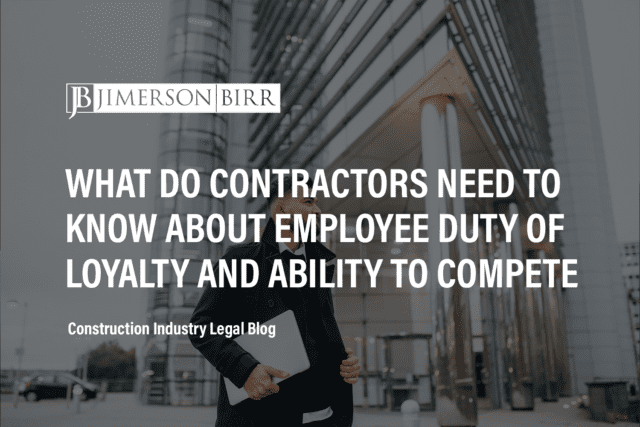What does affirmative action compliance encompass?
Affirmative action compliance in Florida encompasses a diverse set of principles aimed at ensuring equal employment opportunities for individuals from varied backgrounds. Executive branch agencies, state attorneys, and public defenders in Florida are mandated to create an Affirmative Action Plan (AAP) outlining specific goals, timeframes, and measures ensuring equal opportunities in recruitment, selection, and promotion. Private employers are not required to implement AAPs but sometimes choose to do so as part of a formal commitment to workplace equity and equality.
Need help with training, compliance, or litigation to protect your workplace? Schedule your consultation today with a top employment law attorney.
Which laws, rules, and regulations apply to affirmative action compliance?
In Florida, employers must abide by a combination of federal and state laws that govern affirmative action compliance. At the federal level, key statutes include Title VII of the Civil Rights Act of 1964, which prohibits discrimination based on race, color, religion, sex, and national origin, and Executive Order 11246, which mandates affirmative action for federal contractors and subcontractors.
Additionally, Florida’s laws, such as the Florida Civil Rights Act, offer further protections against employment discrimination. Employers in the state must comply with these regulations and ensure their policies and practices promote equal opportunity for all individuals, regardless of their protected characteristics. By adhering to these rules, businesses can foster a diverse and inclusive work environment and reduce the risk of non-compliance penalties and lawsuits.
What are common issues associated with equal opportunity laws that lead to litigation against employers?
Several legal risks can prompt litigation between employers and employees:
- Discriminatory Practices: Engaging in practices violating anti-discrimination laws.
- Reverse Discrimination Claims: Employees adversely affected by affirmative action efforts filing claims.
- Failure to Accommodate: Not providing reasonable accommodations for individuals with disabilities under the Americans with Disabilities Act.
What are the prerequisites to file a lawsuit regarding equal opportunity violations, and what legal defenses may employers assert?
To file a lawsuit regarding affirmative action compliance, employees must meet specific prerequisites and requirements:
- Filing a complaint with the EEOC: Before initiating a lawsuit, employees must file a charge with the Equal Employment Opportunity Commission (EEOC).
- Receipt of a Right to Sue letter: Employees must receive a Right to Sue letter from the EEOC before proceeding with their lawsuit.
- Timeliness: Employees must file their lawsuit within the specified time frame after receiving the Right to Sue letter (usually 90 days).
Employers may assert various affirmative legal defenses in response to claims deriving from affirmative action compliance:
- Statute of limitations: Employers can argue that the employee’s claim is time-barred if it was not filed within the applicable statute of limitations.
- Bona fide occupational qualification (BFOQ): Employers may claim that a specific characteristic, such as sex or age, is a BFOQ, necessary for the job in question.
- Voluntary affirmative action: Employers can argue that their affirmative action efforts were voluntary and in good faith, in line with the guidelines set by the EEOC.
By understanding the prerequisites and potential defenses, both employees and employers can better navigate the complex legal landscape of affirmative action compliance in Florida.
To determine whether your unique situation may necessitate litigation or another form of specialized advocacy, please contact our office to set up your initial consultation.
What measures must employers take to legally comply with affirmative action compliance?
To successfully comply with affirmative action requirements, Florida employers must implement the following measures:
- Develop an AAP as required by the Office of Federal Contract Compliance Programs (OFCCP).
- Ensure equal opportunity in recruitment and collaboration with diverse organizations.
- Implement fair selection processes by establishing unbiased criteria and providing relevant training.
- Promote diversity and inclusion through training and a robust discrimination complaint reporting system.
Please contact our office to set up your initial consultation to see what forms of legal advocacy or intervention may be available for your unique situation.
Frequently Asked Questions
Q1: Are all federal contractors and subcontractors required to have an AAP?
No, only federal contractors and subcontractors with 50 or more employees and contracts of $50,000 or more are required to have an AAP.
Q2: Can employers set quotas to achieve affirmative action compliance?
No, setting strict quotas is not allowed, as it may lead to reverse discrimination claims. Employers should focus on establishing goals to increase diversity and inclusion.
Q3: How often should an AAP be updated?
An AAP should be reviewed and updated annually, especially considering changes in workforce demographics, organizational structure, or regulations.
Have more questions about employment law training, compliance, or litigation?
Crucially, this overview of affirmative action compliance does not begin to cover all the laws implicated by this issue or the factors that may compel the application of such laws. Every case is unique, and the laws can produce different outcomes depending on the individual circumstances.
Jimerson Birr attorneys guide our clients to help make informed decisions while ensuring their rights are respected and protected. Our lawyers are highly trained and experienced in the nuances of the law, so they can accurately interpret statutes and case law and holistically prepare individuals or companies for their legal endeavors. Through this intense personal investment and advocacy, our lawyers will help resolve the issue’s complicated legal problems efficiently and effectively.
Having a Jimerson Birr attorney on your side means securing a team of seasoned, multi-dimensional, cross-functional legal professionals. Whether it is a transaction, an operational issue, a regulatory challenge, or a contested legal predicament that may require court intervention, we remain tireless advocates at every step. Being a value-added law firm means putting the client at the forefront of everything we do. We use our experience to help our clients navigate even the most complex problems and come out the other side triumphant.
If you want to understand your case, the merits of your claim or defense, potential monetary awards, or the amount of exposure you face, you should speak with a qualified Jimerson Birr lawyer. Our experienced team of attorneys is here to help. Call Jimerson Birr at (904) 389-0050 or use the contact form to schedule a consultation.
Here are some blogs written by JB attorneys that provide more information about employment law:
- Independent Contractor or Employee: Know the Difference (jimersonfirm.com)
- Rescinding Job Offers in At-Will Employments in Florida | Jimerson Birr (jimersonfirm.com)
- Tips for Drafting Employee Handbooks in Florida | Jimerson Birr (jimersonfirm.com)
- Understanding The EEOC Process: Employee Sexual Harassment And Sexual Discrimination Claims In The Era Of #MeToo (jimersonfirm.com)
- Contesting OSHA Violations and OSHA Citations: A Guide To OSHA Employer Rights (jimersonfirm.com)
- What Do Contractors Need to Know About Employee Duty of Loyalty and Ability to Compete | Jimerson Birr (jimersonfirm.com)

We live by our 7 Superior Service Commitments
- Conferring Client-Defined Value
- Efficient and Cost-Effective
- Accessibility
- Delivering an Experience While Delivering Results
- Meaningful and Enduring Partnership
- Exceptional Communication Based Upon Listening
- Accountability to Goals











